Seeds of Opportunity: The African Growth Series
April 2022 | Issue 2
In this week's issue, you will learn more about:
- Africa's Energy Challenges and Opportunities to Sustainable Electricity Access for All
- Africa's Central Bank Digital Currencies
- KZN Floods: A test of Economic Resilience
- A Future Dilemma: Renewables, Electric Vehicles and Tax
Africa's Energy Challenges and Opportunities to Sustainable Electricity Access for All
Africa unique energy challenge is once again put into the spotlight as South Africa, one of Africa’s most developed nation, is plunged into darkness. Unprecedented population growth and increased pressure of sourcing energy in a sustainable manner creates a daunting energy challenge for Africa. But it needs to be understood that Africa cannot follow the same energy path as the developed world. Africa needs to take advantage of its natural resources if it is to meet the expected economic and social growth. South Africa has been leading the way in the past and continuous to do so with its REIPPP Programme and recent opening of its 6th Bid Window. The country has set the standard for other nations in sub-Saharan Africa, having procured MW of sustainable energy mostly from solar PV and onshore wind technologies. The latest window is expected to procure a further 2.6 GW of renewable energy from IPPs, of which 1.6 GW are allocated to be generated through onshore wind. Africa needs to continue to attract investment and international companies to its shore, but it needs to secure reliable and consistent energy supply which currently is preventing the necessary economic recovery that Africa needs, especially in a post Covid-19 world. The renewable energy industry is a building block of Africa’s transition, not only is it laying the foundation for other industries to succeed, but also present the opportunity for the creation of new industries, development of the local skill pool and localization across the value chain.

Africa's Central Bank Digital Currencies
Over 80% of global economies are exploring central bank digital currencies (CDC). These are a digital form of a country’s fiat currency, which is money issued by the government and not backed by a commodity such as gold. Digital currencies replace physical cash and the central bank issues electronic coins or accounts backed by the government. Africa’s financial sector is developing its own CDCs to simplify and reduce the cost of cross-border and international settlements. The Atlantic Council's Central Bank Digital Currency tracker has listed 12 African countries interested in testing and implementing CDCs. Progress is not smooth sailing, with Senegal cancelling its CDC project and Egypt's remaining inactive. Despite this, there is hope with Nigeria successfully launching its eNaira in 2021. South Africa is participating in Project Dunbar’s cross-border pilot with Australia, Malaysia, Singapore and the Bank for International Settlements’ (BIS) Innovation Hub. Mauritius is developing its digital currency whilst Eswatini, Ghana, Morocco and four other countries are still in their research stage. Implementing government-regulated digital currencies could improve the financial inclusion, efficiency, and traceability of transactional systems throughout the continent.

KZN Floods: A Test of Economic Resiliance
The KwaZulu-Natal province in South Africa now faces another test of economic resilience following a flooding event that has claimed more than 300 lives and damaged key infrastructure (homes, businesses, and road networks). The official extent of damaged caused by the heaviest rainfall the province has seen in at least six decades has not been released but indications of disruptions in several business areas including transport and logistics, manufacturing (automotive, paper materials), tourism, and mobile network operations, etc since Monday evening have been announced. As an impact of the flooding, operations have been halted in parts of the Port of Durban (including those of A.P. Moller - Maersk), as well as those at the South African Toyota Motor Corporation (TSAM) manufacturing plant at Prospecton south of Durban amongst many others.
The eThekwini Municipality is an important powerhouse in KZN, accounting for 59.88% or R468 billion of the provincial GDP. Furthermore, it is home to sub-Saharan Africa’s largest container hub, handling at least 60% of South Africa’s shipments alone. Therefore a speedy rebuilding of damaged infrastructure will be imperative to reduce severe impacts the economy and several job losses for the sectors affected (tourism, manufacturing, logistics, real estate, etc). The construction industry is among those that need to rise to the task at hand through collaborative efforts from the private and public sectors. The South African government, through the National Disaster Management Centre has declared the floods a disaster to allow easily freeing up funds to help in reconstruction in the area. As the week progresses and water subsides, the damages will be clearer, but with proper implementation of the strong disaster management recovery plans that companies do have should have in place, the positives seen so far in the economy can hopefully be maintained. The new threshold of 50 607 new vehicles sales in the domestic market, set in March 2022 are some positives that must be protected.

A Future Dilemma: Renewables, Electric Vehicles and Tax
''With the eventual increased electric vehicle (EV) uptake and increased solar off-grid solutions in South Africa there may be several issues that need to be accounted for.'' To learn more about Craig's latest paper on Renewables, Electric Vehicles and Tax, click here.
You can also watch a recent interview on CNBC where he addresses these issues with CNBC Presenter, Fifi Peters by clicking here.
To find out more about opportunities in Africa, please contact Lynne Martin.
Lynne Martin
Rebecca Mabika
